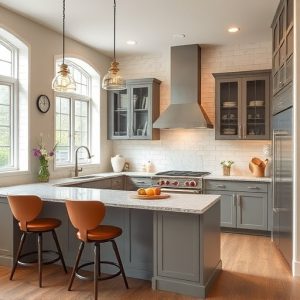Transform your kitchen into an eco-friendly oasis with sustainable materials! In today’s world, choosing green options for your kitchen isn’t just a trend—it’s a conscious decision with a significant environmental impact. From countertops and cabinets to appliances and floorings, this guide explores the best eco-conscious choices for kitchen renovations. Discover how recycled materials, local sourcing, and DIY approaches can create a space that’s both stylish and sustainable, ensuring a greener future for our planet.
- Understanding the Impact of Kitchen Materials on the Environment
- Popular Sustainable Options for Countertops and Cabinets
- Eco-Friendly Appliances: A Game-Changer in Green Kitchens
- Recycled and Natural Materials for Floorings and Wall Coverings
- Efficient Storage Solutions with an Eco-Conscious Twist
- The Role of Local Sourcing and DIY Approaches in Kitchen Renovations
Understanding the Impact of Kitchen Materials on the Environment
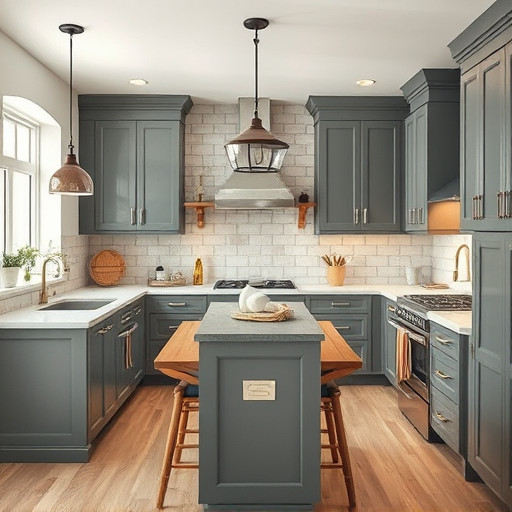
When planning kitchen renovations, it’s crucial to consider the environmental impact of the materials we choose. Kitchen spaces are often bustling centers of activity, with various resources being used daily, from chopping boards to appliances. Traditional materials and products can have a significant carbon footprint due to their manufacturing processes and resource extraction. For instance, many common worktops are made from materials that require high energy consumption during production and transportation, contributing to greenhouse gas emissions.
Moreover, the disposal of kitchen items also poses an issue. Non-biodegradable materials often end up in landfills, where they can take hundreds of years to decompose, causing soil and water pollution. Eco-friendly alternatives, on the other hand, offer a more sustainable solution. By opting for renewable, recycled, or easily recyclable materials, we can reduce our environmental footprint while creating a healthier living space.
Popular Sustainable Options for Countertops and Cabinets
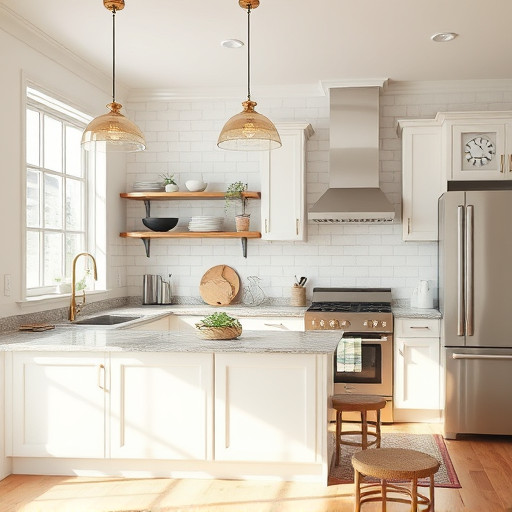
When it comes to kitchen renovations, opting for sustainable and eco-friendly materials is a growing trend among environmentally conscious homeowners. One of the most popular choices for countertops is recycled glass or ceramic tile. These options not only reduce waste but also offer a diverse range of colors and styles, making them aesthetically appealing as well. Many brands now specialize in upcycling discarded glass bottles and tiles, transforming them into durable and beautiful kitchen surfaces.
For cabinets, bamboo and reclaimed wood are excellent sustainable alternatives to traditional materials. Bamboo, known for its rapid growth and strength, is highly versatile and can be used for both cabinets and hardware. Reclaimed wood adds a unique, rustic charm while minimizing the demand for new lumber. These options not only contribute to a greener kitchen but also offer long-lasting durability, making them wise investments for any kitchen renovation project.
Eco-Friendly Appliances: A Game-Changer in Green Kitchens
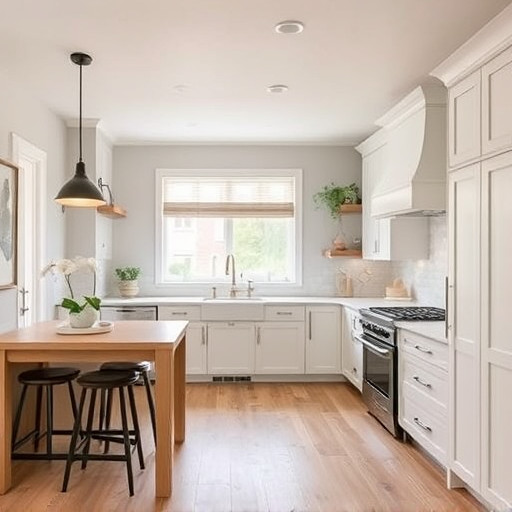
In today’s digital era, kitchen renovations are undergoing a profound transformation with the integration of eco-friendly appliances. These innovative gadgets aren’t just stylish; they’re designed to minimize energy consumption and reduce environmental impact. From smart refrigerators that optimize cooling for less power usage to high-efficiency dishwashers that conserve water, these appliances are leading the charge in sustainable kitchen practices.
By choosing energy-efficient models, homeowners can significantly lower their carbon footprint without compromising on performance. Moreover, many modern eco-friendly appliances come equipped with smart features that allow users to monitor and control energy usage, making kitchen renovations a game-changer for those looking to embrace greener living habits.
Recycled and Natural Materials for Floorings and Wall Coverings
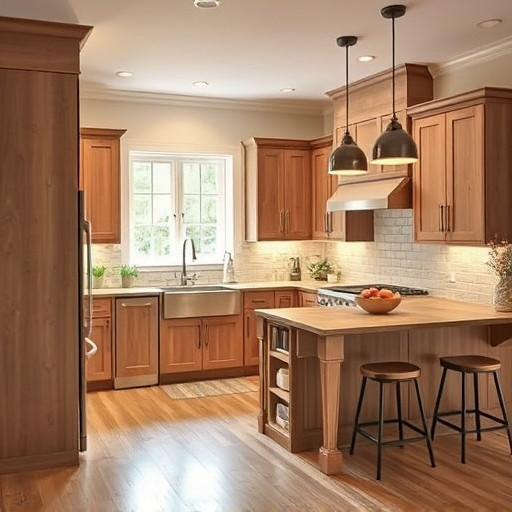
When undertaking kitchen renovations, opting for sustainable and eco-friendly materials can significantly reduce your environmental footprint. Recycled and natural flooring options are at the forefront of this movement. Materials like bamboo, cork, and recycled wood not only offer a unique aesthetic appeal but also boast exceptional durability. They are renewable resources that contribute to a greener planet by reducing the demand for new timber and limiting waste.
Wall coverings made from sustainable materials such as hemp, jute, or linen provide an excellent alternative to traditional vinyl or synthetic fabrics. These natural fibers are not only beautiful but also have air-purifying properties, creating a healthier living space. Moreover, they are easy to install and can be recycled or composted at the end of their life cycle, making them an ideal choice for those looking to incorporate eco-conscious practices into their kitchen renovations.
Efficient Storage Solutions with an Eco-Conscious Twist
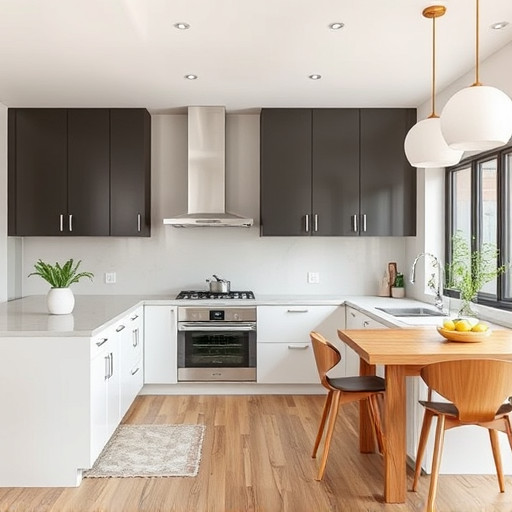
In the realm of kitchen renovations, going green isn’t just a trend; it’s a necessary step towards sustainability. When it comes to storage solutions, eco-conscious homeowners are embracing innovative ideas that reduce waste and maximize space. Efficient storage is key in any kitchen, but by incorporating sustainable materials like bamboo or recycled metal, you can achieve both functionality and environmental friendliness. These materials offer durability and style while minimizing the carbon footprint associated with traditional options.
Beyond aesthetics, eco-friendly storage options often come with added benefits such as being free from harmful chemicals and easier on the wallet in the long run. From magnetic strips made from recycled content to bamboo drawer organizers, every choice contributes to a greener lifestyle. Such solutions not only enhance the overall look of your kitchen but also encourage a more organized and streamlined space, making daily tasks more efficient and eco-conscious.
The Role of Local Sourcing and DIY Approaches in Kitchen Renovations
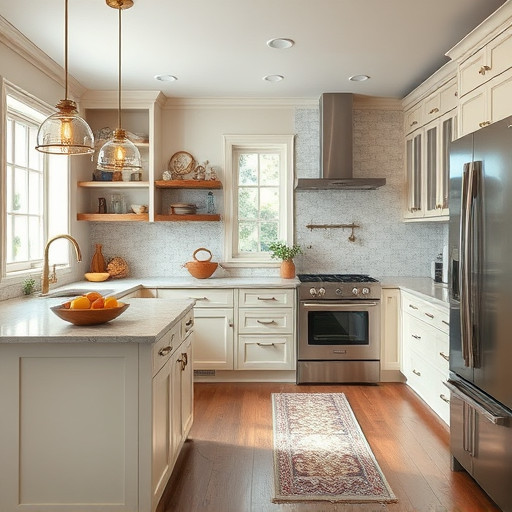
When undertaking kitchen renovations, embracing local sourcing and DIY approaches can significantly enhance sustainability efforts. By opting for locally sourced materials, you reduce the carbon footprint associated with long-distance transportation, aligning with green principles. Additionally, supporting local suppliers often means accessing unique, eco-friendly options that contribute to a one-of-a-kind, sustainable kitchen design.
DIY initiatives further promote environmental friendliness by allowing you to customize your space precisely. Upcycling old furniture or creating custom cabinets from reclaimed wood not only saves resources but also adds character and individuality to your kitchen renovation project. This do-it-yourself approach empowers homeowners to take control of their eco-friendly transformations, ensuring every aspect of the process aligns with their commitment to a greener lifestyle.
In the pursuit of sustainable kitchen renovations, embracing eco-friendly materials is a powerful step towards reducing environmental impact. From countertops and cabinets to floorings and appliances, numerous options exist to create a green oasis. By choosing recycled, natural, or locally sourced materials, you contribute to preserving our planet while enhancing your space. Incorporating efficient storage solutions and DIY approaches further solidifies your commitment to eco-conscious living. Remember, every small change in kitchen materials makes a significant difference for the environment.
